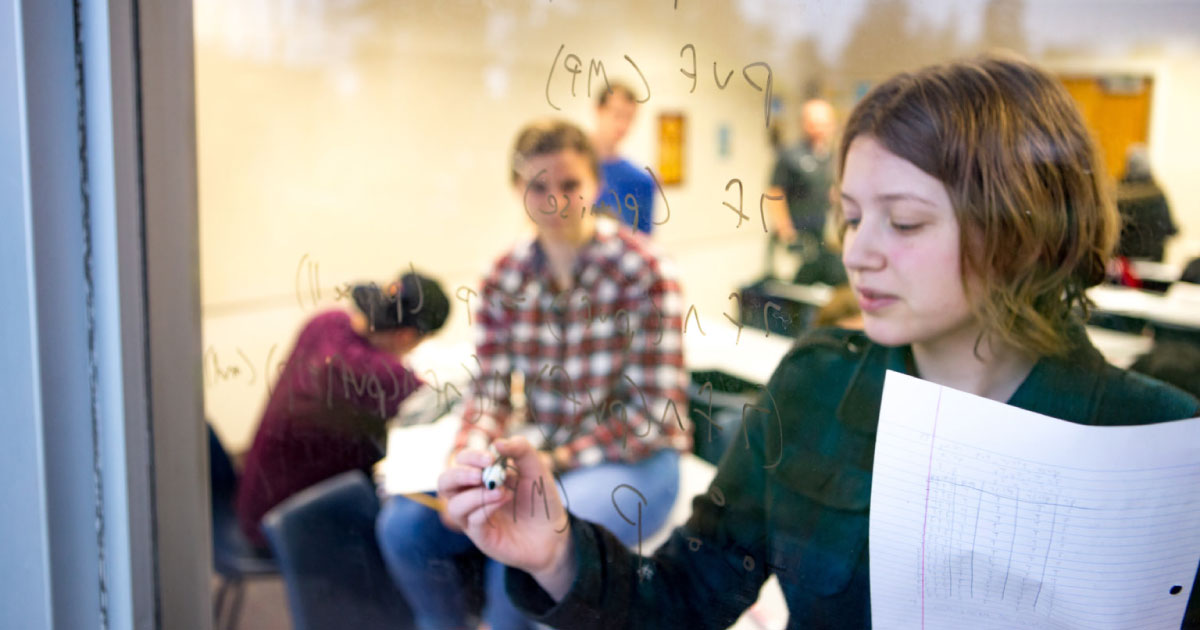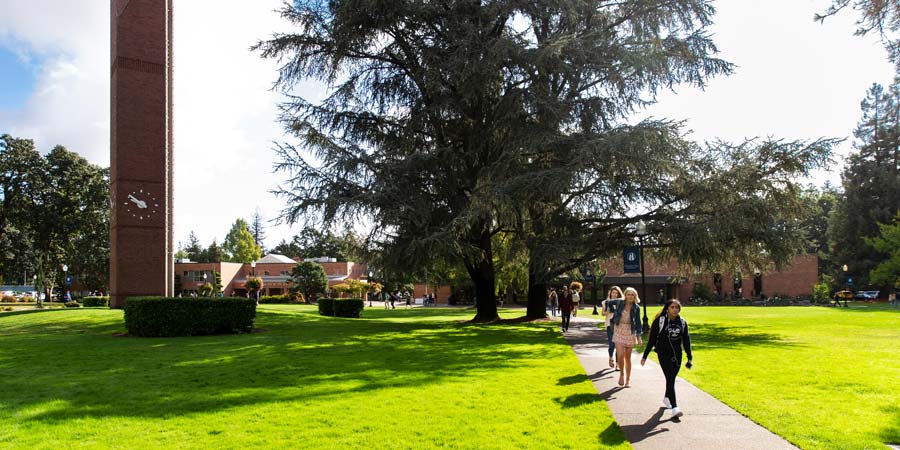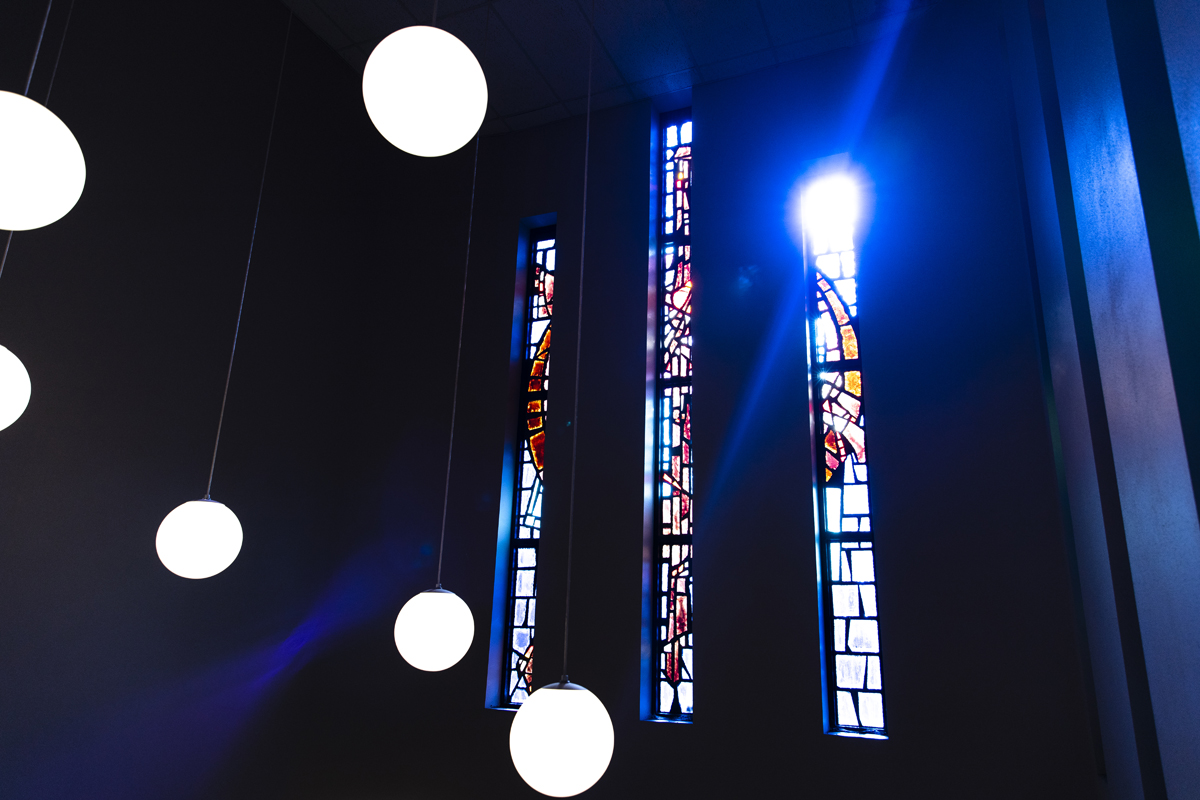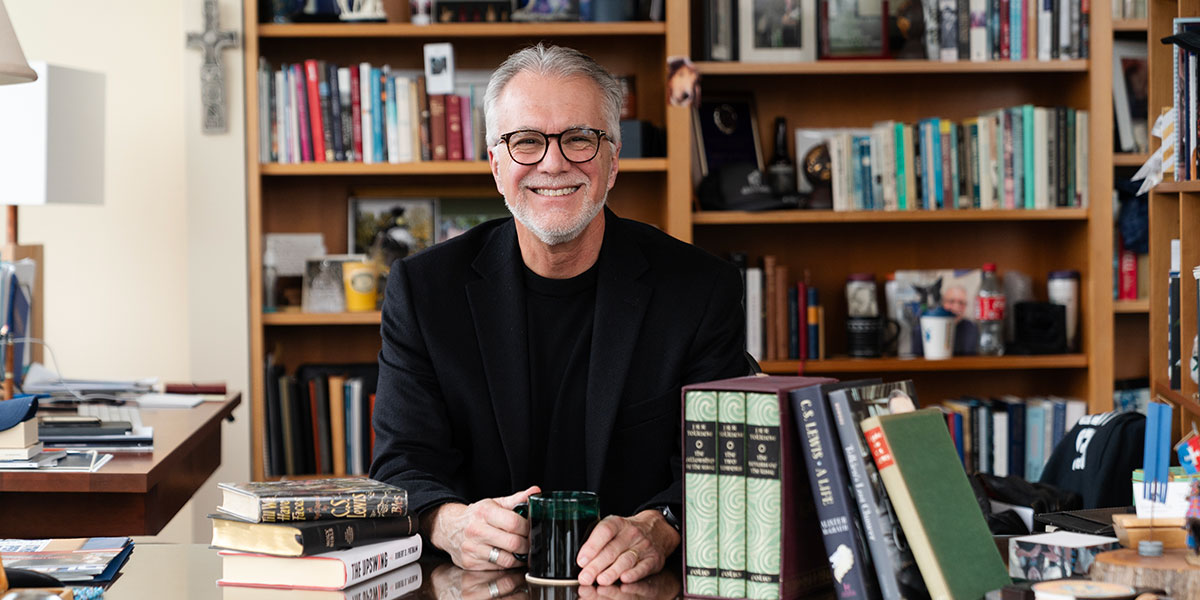
Being Known, Mathematics, and Faith
by Pete Rusaw
Pete Rusaw, Assistant Professor of Mathematics
Being Known
It’s the hope each student brings to the college experience. To be known by name. To be understood, valued, encouraged and uplifted. At George Fox, to be known means that professors and staff connect with students in authentic ways – personally, academically, spiritually – recognizing that we all come to this place with different backgrounds, life experiences and dreams for the future. To be known means that students not only learn new ideas, they share their own. To be known means to be heard. When students feel what it’s like to be known in this way, they become inspired. And that’s when real change happens. Knowledge moves from the mind to the heart. Careers turn into callings. Faith turns into action. And that’s why we begin with a simple promise, that each student will be known.
Be Known. Two words that sum up the heart of God. God is love, which can only be defined in relationship, for if there is no object – no other – then love is absent. “All of the law and the prophets are summarized,” says Jesus, “when we love God and love others.” The love that he speaks of is not simply a feeling, but a commitment to, and an experience with, another. We only love because he first loved us (1 John 4:19). As God condescends and gives of himself to us, not simply by his support, but also with his companionship, (Matthew 28:20) we begin to understand that love is a relationship and that relationships are all about knowing. Not simply knowing information (though that is a start) but also relating. Interacting at an honest, heart-level, where barriers are moved aside, people are vulnerable with one another and each is used by God in the other’s transformation toward Christ-likeness.
The Be Known promise resonates deeply within my heart. In 25 years of teaching, knowing my students has been my primary objective as I have sought to make a difference in the lives of those God has placed under my care. Admittedly, connections with students fall on a continuum. Sometimes students become lifelong friends. Other times it seems you’ve made an enemy, despite the effort. However, not only would I say that the majority of my former students fall much further toward the positive end of the scale, I believe my efforts to pursue the person first have disarmed many pre-conceptions and broken down barriers of anxiety and unbelief in my students.
The bottom line, I believe, is that when a teacher places value on people before performance it not only unlocks learning and potential, it also softens the student’s “heart-soil” to be more open to Jesus’ entrance and movement within. Thus, the Be Known promise is possibly the best strategy to carrying out the Great Commission given to us by Jesus in Matthew 28:18- 20, when he said, “All authority in heaven and on earth has been given to me. 19 Go therefore and make disciples of all nations, baptizing them inthe name of the Father and of the Son and of the Holy Spirit, 20 teaching them to observe all that I have commanded you.” As we carry this out, the ground work will be laid for accomplishing the mission of George Fox University: creating a Christ-centered community which prepares students spiritually, academically and professionally to think with clarity, act with integrity and serve with passion.
Mathematics & Faith
John 1 states, “In the beginning was the Word and the Word was with God and the Word was God … and He became flesh and dwelt among us.” The Greek word for “word” is logos, a name God gives Himself, which is where we get our English word “logic.” Additionally, the book of Genesis teaches that God (the Logos) made man in his image. I believe that this is the reason mankind has the ability to think logically, to reason, to create and to be self-aware. We are the special and “very good” part of his creation, built by the Creator to be little creators – not simply to build physical things, but also (and maybe more importantly) to build systems of thought. Logic is the system of thought, or rules, which create and govern all other systems. It allows us to transcend observation and discover implication, meaning and purpose; at times, even to speculate on motivation behind phenomena (though at this depth it seems at least some revelation is necessary, depending upon what is being explained). I find it fascinating that, though people will argue without end, about politics, religion, values, truth, parenting, etc … that when it comes to rational thought there is a system which has been from the beginning, and is universally accepted as the “sense making” regulator, regardless of culture, era or discipline of study. I believe this is because God is the Logos and as he breathed his logos into us upon creation we, in turn, began to express it in every aspect of our lives through rational thought.
Mathematical systems are generated by, and require, pure logic. Whether a person accepts Euclid’s five postulates, or pares the assumptions down to four, the same rules build the rest of the theorems. In considering the rings, fields and groups of Abstract Algebra, all these same rules of logic must be applied rigorously or one’s conclusions have no validity. The logic that all mathematicians bow to, without question, seems to be a form of conscience that, sadly, is often given god-like status in the minds of thinkers and is thought to be the True God’s most formidable opponent. However, I believe that the universal language of mathematics is one of the most significant and powerful pieces of evidence in favor of the reality of God. What could better explain the universally accepted rules of logic that form all our systems of thought than that our sense making has a common origin and Creator? Thus, the study of mathematics provides a beautiful platform to discover, appreciate and worship our great God who is, among other things, the supreme mathematician!
God is a God of order and organization. He has arranged the universe exactly as he wants it and sustains that arrangement with (super)natural laws which keep things moving in beautiful, mathematically predictable, harmony. He is one who not only puts things together (consider the fantastic intricacies and design of a single cell), he keeps them together (Colossians 1:17, ex: chemical compounds) – again with a beauty and power that we can not only observe, but that our logical (“logos” John 1:1) minds can quantify and predict. From the beginning of mankind, God placed Adam and Eve in the Garden of Eden and told them to “take something wild” (the Earth) and fill it, subdue it and organize it. He then commanded his people to order themselves in marriage, in community, in government and in worship. In all these things, and more, the God of Order has spoken mathematically to his people. Sometimes he speaks to us literally with numbers (consider the measurements and numeric requirements in the construction of the tabernacle, the quantifying of the Israelites in the genealogies or even God’s specific instructions for the preparation of war in the Old Testament), but more often he brings his order to us with principles to obey which arrange people for functionality, efficiency and peace in relationships.
Mathematics, in its purest form, is the ordering of things: numbers, related quantities, physical properties, etc. As each number, formula and principle finds its place in the system, the beauty and function of the mathematics increases. Why? Because we were created by, and for, the God of Order (Colossians 1:16), and as we bring things into order we see glimpses of his character through our arrangements. Eventually, he will bring all things to order, under one Head, which is Christ (Ephesians 1:10). On that great and powerful day of the Lord, I believe the revelation of his new order of things will bring unparalleled mathematical understanding as the scales fall from our sinful eyes and we behold his true glory, becoming “like” him (1 John 3:2).
Mathematics is a fantastic vehicle for understanding God. As we study and discover the order with which God has created the universe, as well as the rationality he has gifted us “image bearers” with, we are brought to even greater depths of awe and gratitude over his work and person. Thus, every class meeting is filled with the potential to worship Jesus more fully as we look into delightful aspects of his revelation to us.
This document has been edited with the instant web content converting tool which can be found at htmleditor.tools - give it a try.






